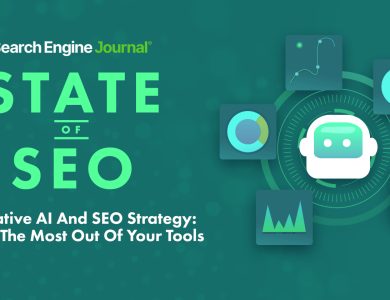
As the online world becomes saturated with curated and repetitive content, it’s crucial to develop an SEO strategy that boosts your site’s visibility on search engines, enhancing your organic rankings and traffic.
Many marketers know basic SEO tactics, but not everyone understands the reasoning behind them.
With AI’s emergence, we can expect a surge in content creation—some of which will be decent, and some exceptional.
The increasing content volume, faster execution of certain tactics, and the overall push to accelerate SEO efforts will continue to shape a novel environment.
Regardless, activity guided toward specific goals remains vital, perhaps more than ever.
Sure, things can be quickly launched and tested now, but are these actions impacting overall marketing and business objectives, producing measurable ROI, or just adding more noise and activity?
This article will explore why investing time and effort into SEO strategy development is essential for businesses or individuals aiming to elevate their marketing efforts.
### What Is An SEO Strategy?
An SEO strategy is a planned approach to how you will leverage SEO to meet your marketing goals.
Anyone can produce content that attracts traffic; however, an SEO strategy ensures you’re attracting qualified traffic.
Strategy represents the reasoning behind your tactics.
Suppose your goal is to increase the number of leads generated from Audience A.
Your strategy might focus on boosting traffic to a specific topic cluster on your site.
From there, tactics might include optimizing bottom-of-funnel evergreen pages within that cluster or creating more blog articles targeting top-of-funnel visitors.
Supporting your content creation strategy requires executing various tactics to ensure your content ranks well.
As evident, strategy and tactics both support and rely on each other.
### Why Is SEO Strategy Development Important?
A well-defined strategy can set your SEO campaign for success before it launches.
Having one allows you to align individual tactics with strategies focused on specific key performance indicators (KPIs).
Just as no two businesses are identical, marketing strategies vary too.
The SEO plan for an ecommerce website is markedly different from that of a B2B site focused on lead generation.
Checklists are beneficial for organizing work.
However, “checklist SEO”—following a list of “best practices” without considering your brand’s context—may not yield the full scope and scale of desired results.
#### Maximizing Resources
SEO implementation demands time and effort.
Without a well-thought-out strategy, resources might be scattered, leading to wasted efforts and limited outcomes.
Strategic planning optimizes resource allocation, concentrating on the most impactful tactics that offer the best return on investment.
#### Integrating Your Marketing Efforts
An SEO plan, the result of your strategy development work, can be integrated across all channels for a cohesive marketing strategy.
An integrated approach ensures your efforts aren’t cannibalized across channels.
With aligned messaging across your channels, you create a stronger bond between your brand and your audience, regardless of where they engage with you in the funnel.
Ultimately, this enhances your online presence, customer engagement, and overall marketing goals.
#### Staying Ahead Of The Curve
Search engine algorithms are ever-changing, and what works today might not be effective tomorrow.
An SEO strategy involves staying ahead of industry trends, tracking algorithm updates, and adapting your approach to stay competitive.
Embracing a proactive strategy provides a significant advantage over competitors lagging behind.
While documenting your strategy in a plan is recommended, it must remain dynamic—subject to change as tactics are executed, and learnings are integrated to refine the strategy further.
Documentation brings objectivity to strategies and tactics, but adapting and staying ahead of the curve is crucial, unlike running the plan like a checklist and ignoring signals indicating the need for refinement.
#### Building Authority And Credibility
A well-executed SEO strategy not only enhances search rankings but also bolsters your brand’s authority and credibility.
By consistently delivering valuable, relevant content, you build trust and establish yourself as an industry thought leader.
Higher search rankings, supported by authoritative content, boost potential customer confidence, driving them toward your end goal.
Quick wins are possible, focusing on bottom-of-the-funnel, customer journey-focused keywords and topics.
These can generate leads and sales if optimized well.
However, brand-building differentiates you, raises awareness during the research phase, and supports lifetime value.
If not competing solely on price, building a brand identity that reflects your products/services’ unique value proposition is vital.
#### Data-Driven Decision Making
One significant advantage of developing an SEO strategy is the focus on data-driven decision-making.
A strategic approach requires ongoing tracking, analysis, and interpretation of key performance indicators (KPIs).
Analyzing data provides insight into your audience’s behavior through their actions on your site.
Data insights identify what works and what doesn’t, allowing for informed decisions and continuous SEO optimization.
### How To Measure The Effectiveness Of Your Strategy
With tools like Google Analytics 4, measuring the success of your SEO campaigns and overarching marketing strategy becomes easy.
GA4 offers reports and features to track visibility, engagement, and conversion KPIs most relevant to you, understanding your SEO efforts’ impact on business goals.
By leveraging Traffic Acquisition, Conversion, Google Search Console, and Landing Page reports, you can measure performance through various parameters.
Regular analysis of these reports is vital for staying ahead of competitors and trends.
Valuable data-driven insights enable more informed decision-making while continuously optimizing your SEO strategy.
### Conclusion
As noted earlier, SEO is changing.
AI has reshaped the status quo, ushering in positive changes that facilitate smarter, faster actions.
Despite these changes, focusing remains a constant challenge in SEO.
Numerous resources discuss components of effective SEO—many validated and advised. But are they all right for your brand or organization? Likely!
Nonetheless, aimless tactics, automated or not, may be wasteful.
No one-size-fits-all approach exists for SEO.
Many tactics may be similar, but prioritizing them, aligning them with your status, and connecting them to your business opportunities and goals in a cohesive strategy is essential.
You can support and gain alignment on your strategy, revising it as you learn during your SEO process, transforming something seemingly subjective and endless into a measurable, improvable, and provable process.



